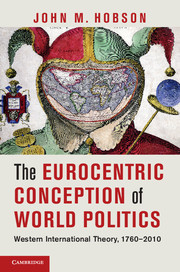Book contents
- Frontmatter
- Contents
- Figures
- Tables
- Acknowledgments
- 1 Introduction
- Part I 1760–1914
- Part II 1914–1945 The high tide of manifest Eurocentrism and the climax of scientific racism
- Part III 1945–1989 Subliminal Eurocentrism in international theory
- Part IV 1989–2010 Back to the future of manifest ‘Eurocentrism’ in mainstream international theory
- 11 Imperialist and anti-imperialist Eurocentrism
- 12 Imperialist Eurocentrism
- Part V Conclusion Mapping the promiscuous architecture of Eurocentrism in international theory, 1760–2010
- References
- Index
11 - Imperialist and anti-imperialist Eurocentrism
post-1989 ‘Western realism’ and the spiritual return to post-1889 racist-realism
Published online by Cambridge University Press: 05 June 2012
- Frontmatter
- Contents
- Figures
- Tables
- Acknowledgments
- 1 Introduction
- Part I 1760–1914
- Part II 1914–1945 The high tide of manifest Eurocentrism and the climax of scientific racism
- Part III 1945–1989 Subliminal Eurocentrism in international theory
- Part IV 1989–2010 Back to the future of manifest ‘Eurocentrism’ in mainstream international theory
- 11 Imperialist and anti-imperialist Eurocentrism
- 12 Imperialist Eurocentrism
- Part V Conclusion Mapping the promiscuous architecture of Eurocentrism in international theory, 1760–2010
- References
- Index
Summary
Introduction: ???things can only get bitter???
In recent years a number of important postcolonial-inspired readings of post-Cold War IR theory have emerged, arguing that the mainstream has promoted an imperialist vision of world politics. In this and the next chapter I want to push this reading along several notches. Three points are of immediate significance. First, I argue that a significant strand of Western-realism also exhibits an anti-imperialist politics, specifically the cultural realism of Huntington and Lind that I examine at the end of this chapter. Second, in focusing on what I call ‘Western-realism’ in this chapter and ‘Western-liberalism’ in the next – two generic theoretical conglomerates that comprise a variety of component theories – I reveal how they rest on different, albeit complementary, Eurocentric metanarratives, thereby providing a more nuanced picture of mainstream Western neo-imperialist international theory. And third, I argue that whereas Eurocentrism was subliminal and hidden away in the 1945–89 era, it returns in its manifest version after the end of the Cold War.
The Western-liberal wing of mainstream international theory relies on a paternalist Eurocentrism that sings the world into existence with the idiom that ‘things can only get better’, and that through paternalist interventionism the East can be culturally converted along Western civilizational lines in order to make the world a better place for all peoples (as I explain in the next chapter). This optimistic and ‘progressive’ vision is countered by Western-realism which sings the world into existence with the idiom that ‘things can only get bitter’, such that the West’s only option is to imperially contain the ‘new barbaric threat’ to civilization and world order. This approach is fuelled and galvanized by a pronounced degree of Western angst and relative degrees of pessimism concerning the challenges allegedly confronting Western civilization. This sensibility is characterized by Samuel Huntington: that ‘this new world is a fearful world and Americans have no choice but to live with fear if not in fear’ (Huntington 2004: 341). Moreover, the title of a significant piece by Daniel Pipes relayed this angst into the Western imagination: ‘The Muslims are Coming! The Muslins are Coming!’ (Pipes 1990). These statements and many others like them reflect the politics of Western anxiety and insecurity that underpin ‘offensive Eurocentric’ and ‘defensive Eurocentric’ international theory.
- Type
- Chapter
- Information
- The Eurocentric Conception of World PoliticsWestern International Theory, 1760–2010, pp. 257 - 284Publisher: Cambridge University PressPrint publication year: 2012



